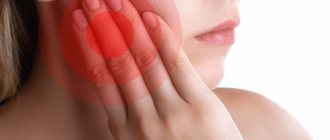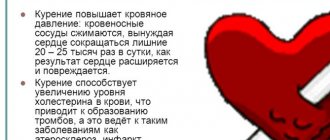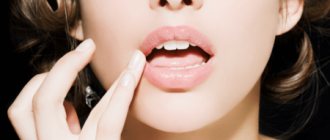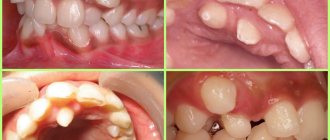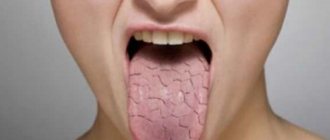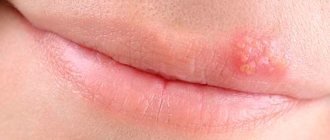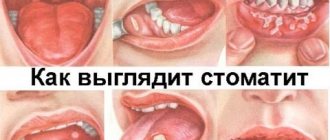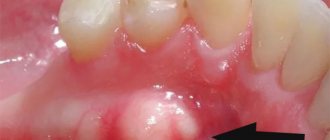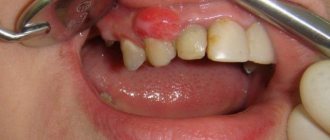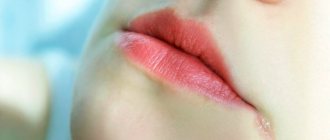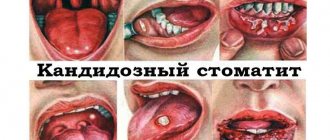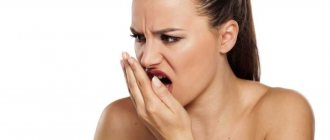Causes
This is not to say that biting the cheek or lip inside occurs frequently and is a serious problem. In most cases, this happens due to inattention: a person tries to combine several things at the same time. It is not for nothing that there is a proverb: “When I eat, I am deaf and dumb.” After all, it is precisely because people talk while eating, or try to have a snack on the go, that damage to the soft tissues of the oral cavity occurs. The listed situations can be classified as isolated, and the injury will be considered acute.
The second most common cause of soft tissue damage to teeth is anesthesia. If a strong drug was used for pain relief, the patient may feel numbness for several hours after the end of treatment at the dentist. Since sensitivity is lost, during a conversation or eating there are often cases when a person bites the mucous membrane until it bleeds.
Children are no less susceptible to such injuries than adults, which often happens during active play, when the baby is so carried away that he does not pay attention to the objects around him and does not control his movements.
However, in medical practice there are cases when patients constantly bite their cheek, which is facilitated by certain prerequisites:
- bruxism - grinding of teeth during sleep, caused primarily by spasm of the masticatory muscles, although the exact root causes of this phenomenon have not yet been studied;
- sharp edges of the teeth, resulting from trauma, pathological abrasion or imprecisely made restoration, contribute to the fact that the lip or mucous membrane of the cheek can be bitten from the inside;
- a habit that arises against the background of emotional overstrain and stress;
- pathological bite (lateral crossbite or deep);
- incorrectly performed orthopedic structures;
- A wisdom tooth located outside the dentition, the crown of which is directed to the buccal side, also constantly bites the cheek.
All of the above cases lead to chronic injury, which in some situations poses a threat to human health.
Getting rid of the habit of biting your lips
The habit of biting lips is a problem for most adults. Thinking about the problem, worrying and worrying, they bite their own lips. It looks unaesthetic. This way it is easy to cause infection and inflame the skin.
You can get rid of such a habit. You need strict control over your actions and detailed psychoanalysis.
Possible reasons
We use our lips to express our feelings. There are people who have developed the habit of biting their lips or cheeks. This expresses their feeling of self-doubt and worry. This facial gesture shows that a person is puzzled by something, feels fear and is nervous about something.
The habit begins in childhood. Its causes: lack of attention, lack of parental love, frequent stress and nervous breakdowns. By biting his lip, the child tries to hold back tears or anger when he is scolded.
He does this when he doesn’t know the answer in class and is nervous about it. He bites his skin every time he experiences negative emotions. If the baby does this regularly, then the action becomes a habit.
And being of a conscious age, he cannot get rid of it.
Biting the skin helps calm you down. In this way a person tries to cope with emotions. When he makes this gesture, he feels better and calms down faster. They believe that physical pain sobers up and helps you come to your senses.
The habit of biting your lips is a way to get rid of rough skin. In a strong wind, lips often become chapped, the skin becomes flaky and irritating. And instead of lubricating it with a moisturizing balm, the person once again chews off the rough skin. But often this brings discomfort. Lips can be bitten until they bleed, which will lead to the formation of cracks.
Consequences
Bitten lips look unattractive. Especially if wounds with blood are visible. Even beautiful lipstick won't help hide it.
Other consequences:
- Inflammation. Infection can occur through cracks. Especially if you have another bad habit - biting your nails. And herpes on women’s lips looks ugly.
- Discomfort. For a person with bitten lips, every meal will be problematic. There will be a burning sensation and pain in places where there are wounds. Especially if the dishes are salty and spicy.
- Skin condition. Due to constant biting, the skin will become rough.
Problems with the lips and chewing on the inside of the cheek can cause problems throughout the mouth. This negatively affects the condition of the teeth. Microbes penetrate the oral cavity and begin to multiply instantly. The result is plaque, caries, ulcers on the inside of the lip.
Self-treatment
It is imperative to get rid of bad habits. This develops willpower.
Learn to control your actions. Pay attention to what you do in moments of stress and anxiety. Motivate yourself. If the process could not be stopped in time, you can come up with a light punishment.
Ways to get rid of the habit of biting your cheek and lips:
- Pamper yourself after every small victory. If you manage to spend the planned time without biting the skin on your lips, give yourself a little encouragement. This could be a sweet, half an hour of rest, a walk. Relaxing treatments like going to a spa or massages are excellent motivation.
- Taking vitamins. Deficiency of essential vitamins and minerals negatively affects the skin. It is important to start taking the appropriate medications to get your lips and mouth in order. You need to drink the whole complex. For a list of medications, you should consult a dermatologist or cosmetologist.
- Sedatives. If cheek biting is caused by nervous breakdowns or mental disorders, calming pills will help. They improve the condition of the nervous system, making it easier for a person to find harmony with himself. Be sure to contact a neurologist for an appointment.
- Proper care. This is especially true for girls. It is necessary to use special creams and ointments. Before going to bed and going outside, thoroughly lubricate your lips with a moisturizing balm or hygienic lipstick.
If your lips are bitten or have cracks, applying lipstick to them is prohibited. This may make the situation worse. Yes, and it doesn't look nice. Only special care products are allowed. This will help make your skin well-groomed, soft and beautiful.
Relatives can help you cope with the problem. Ask them to remind them not to pick the skin every time it happens. The patient will feel ashamed and want to get rid of the habit as soon as possible.
Working with a psychologist
In psychology, the habit of cheek biting is called a mental pathology. To treat it, a technique such as psychoanalysis is used. It is necessary to determine the reasons why the habit of peeling lips or cheeks was formed. To do this, the patient is asked to consider the following:
- why do I bite the skin on my lips;
- what happens if you replace this habit with another action;
- how I feel when I bite my cheek;
- Does it make me feel better after this?
This allows you to understand whether the disease is related to mental disorders or whether it is a need to remove rough skin. If a person has a second cause, self-treatment should be tried. If the problem arises at a psychological level, you need to seek help from a specialist.
The psychologist asks you to imagine a situation that causes stress and makes you nervous. The doctor’s task is to monitor the patient’s behavior and actions. Usually, habitual actions are performed automatically, on a subconscious level. And if the client begins to bite his cheek, then additional sessions are scheduled. If not, he is asked to start caring for the epidermis.
The client is given homework. These may include finding a favorite activity or hobby. This includes physical activity, travel, new hobbies, and visits to cultural institutions. The main thing is for the patient to relax and forget about his problems. Every competent psychologist says that this technique is effective. And in addition to treatment, it helps you develop yourself and become better.
The psychologist asks the patient to use affirmations. These are positive statements whose purpose is to motivate a person. They work through self-hypnosis.
Effective affirmations:
- I will succeed;
- I will definitely stop biting my cheek;
- I have enormous willpower;
- I can deal with my problem very quickly;
- I will stop biting my lips and they will look attractive, etc.
Such phrases help a person to believe in himself. It is important that close people repeat them to the person. This will be double motivation.
The average number of sessions in the course is 5. Depends on the mental state of the patient and his desire to cope with the problem.
Conclusion
The habit of biting the cheek or lips is a problem for many adults. This indicates their lack of self-confidence, worries, fears and other problems on a psychological level. The result is ugly, bitten lips.
Self-medication will help you cope with the problem. The main thing is to have desire and willpower. Initially, you need to start taking care of your skin, which will help with moisturizing lipsticks and balms. If this is not enough, you can contact a psychologist. He will conduct psychoanalysis and help the patient get rid of the bad habit forever.
Source: https://urazuma.ru/zavisimosti/privychka-kusat-guby.html
First aid for damage
The first thing to do is to stop the bleeding and disinfect the injured surface, which will protect against the addition of pathogenic microflora and the development of an infectious process.
- Stop bleeding. It should be said that bleeding occurs in case of severe damage to soft tissues, but if the injury is minor, then a slight swelling appears. You should rinse your mouth with clean cold water, which helps to constrict blood vessels and thereby stops blood flow. If this does not help and the bleeding does not stop on its own, you need to moisten a sterile gauze pad with hydrogen peroxide and apply it to the wound.
- Relieving swelling. By applying an ice cube to the damaged area, you can reduce not only the swelling, but also the pain.
- Anesthesia. If your home medicine cabinet contains lidocaine spray or gels that are used during teething in children, then these drugs can also numb a bitten lip or cheek on the inside.
Possible negative consequences
The presence of a permanent wound surface is an impetus for the development of various inflammatory processes. This is due to the fact that pathogenic microflora is constantly present in the oral cavity, and it tends to develop rapidly under favorable conditions.
This can cause the following pathologies:
- Development of aphthous stomatitis. The patient develops small ulcers in the mouth, called aphthae. They have the hallmark of severe pain.
- Stomatitis of herpetic etiology. The disease develops against the background of a reduced immune status of the body. The herpes virus is present in almost every person, but the disease occurs only if the body's defenses are weakened. The clinical picture is accompanied by a rash of small blisters filled with liquid. As they mature, their wall becomes thinner and they burst. What causes pain. This disease is most often registered in the female part of the population and in childhood.
- The occurrence of an ulcer as a result of constant trauma. This is the most common painful pathology of mechanical damage to the soft tissues of the oral cavity. In addition, it can occur as a result of a burn when eating hot food. Adequate therapy can quickly eliminate this problem.
- Tuberculous ulcer. A distinctive feature is the yellow color, granular structure and increased pain. Upon visual examination, it differs from other ulcerative lesions by its uneven edges.
- Oncological ulcer. It has a compaction in the center and, despite the complex of therapeutic measures carried out, does not heal for a long time. At the same time, it tends to spread to nearby tissues.
In most cases, it is not possible to independently identify the true cause of the problem. Therefore, you should not postpone going to the doctor.
How to speed up healing
In most situations, first aid, when a man or woman has bitten the lower lip and it is swollen, is enough to heal the wound on its own. But if the damage is deep enough or tissue infection occurs, then the use of medications cannot be avoided.
Application of gels - Metrogyl denta or SolcoserylTo remove signs of inflammation and also to speed up wound healing, Metrogil-dent gel is used. The drug is applied to the damaged area after preliminary rinsing with water or a decoction of medicinal herbs 2-3 times a day for 7 to 10 days.
|
BathsTo prevent infection, if an ulcer has formed, you can perform a mouth bath with an antiseptic. Miramistin, chlorhexidine or furacillin are best suited for these purposes. It is not advisable to use solutions containing alcohol (iodine, brilliant green) to treat the mucous membrane, as this dries out the tissue and causes irritation of the wound. |
Treatment of wounds with oilsTo ensure faster healing, keratoplasty – drugs that promote tissue regeneration – is successfully used for treatment 2-3 days after injury. Sea buckthorn and rosehip oil, caratoline, as well as a solution of vitamins A and E in oil have this effect. The products are applied directly to the wound with a cotton swab at least twice a day. |
If the listed drugs do not help, then you need to consult a doctor: he will select medications to treat the damaged area.
Habit of biting lips and cheeks: gnawing, from the inside, peeling
Many people have the bad habit of biting their lips. For some, this action helps to calm down, and for others, to remove rough skin on the lips.
Reasons for the habit
The bad habit of biting your lips doesn’t just appear. It can form at any age, but usually it is the period of childhood and adolescence. In most cases, the habit indicates problems of a psychological nature.
The main reasons for the habit:
- Lack of parental attention. The child receives little love from his parents. He needs his mother's hugs, kisses, and praise. He has a bad relationship with his family. Instead of love and affection, he usually receives punishment for bad behavior and bickering. In such cases, the child involuntarily begins to slightly bite his lips, and may also gnaw on the inside of his cheeks. After some time, this unconscious movement turns into a habit.
- Negative emotions. Adults bite their lips or cheeks when they cannot control their emotions. Some are hysterical, and there are those who simply silently bite their cheeks in the hope of getting rid of emotional discomfort. The habit may occur when stress is experienced at work. The person reacts too emotionally to this situation. He is overwhelmed by frequent anxious feelings and, in order to calm down, he bites his lips and cheeks. In this way he inflicts pain, wanting to quickly bring himself to his senses. Sometimes a person bites his cheeks even while laughing.
- Desire to get rid of rough skin. In frost or strong wind, lips become chapped. Their surface becomes rough and the skin cracks. This creates some discomfort. Some people end up chewing off the flaky crust.
Another reason when they bite from the inside of the cheek is that the person is in thought. This simple action helps keep him focused on the problem and not lose focus. After he has thought through all the important issues, the action stops.
If a child had a good, carefree childhood, then he will not have the bad habit of biting his cheeks. Otherwise, you should first find out the reason why this disorder was formed and later try to eliminate it.
Correction
Getting rid of the habit of biting your lips is difficult, but it is possible. This will take 10–40 days.
The first thing to do is to find the reason for this habit. You need to listen to yourself, focus on your behavior. You will notice under what circumstances you start biting your lips. You need to try to control yourself and not commit such manipulations.
It is important to learn to control your actions and emotions as well. In moments of strong emotional outbursts and when thoughtful, try to restrain yourself from biting your lips. Remember what the consequences of this addiction are: inflammation, cracks, burning sensation on the lips.
Other recommendations to help you overcome your bad habit:
| № | Method name | Description |
| 1 | Quiet lifestyle. | Try to protect yourself from stressful situations as much as possible. It is important that positive emotions prevail. If this cannot be avoided, then learn how to relieve stress in a pleasant way. You can go for a relaxing massage or go to spa treatments. It is convenient to carry out aromatherapy and color therapy at home. Sometimes a regular bath with warm water will help. |
| 2 | Reward for successfully overcoming a problem. | For any success you need to reward yourself, especially when fighting a bad habit. Set yourself specific deadlines within which you need to take a certain step towards overcoming the problem. If you managed to hold out, reward yourself with something pleasant - a trip to the cinema, a cafe, etc. |
| 3 | Proper care. | If the cause of bitten skin is excessively dry lips, then it would be advisable to purchase a moisturizing or nourishing lip balm. It is applied at night, before going outside (especially in winter or when the weather is windy) or at any other convenient time, and the balm is also used before applying lipstick to make cracks less noticeable. |
| 4 | Taking vitamins. | If the habit of biting your lips occurs due to vitamin deficiency, then you need to take a course of vitamins. It is especially important to increase the amount of vitamins A, E and group B. If vitamin deficiency occurs in winter, you need to introduce more fruits and vegetables into your daily diet. Vitamin A is found in pumpkin, carrots, sea buckthorn, and bell pepper. Vitamin E is present in spinach, eggs, almonds, soybeans, and peas. B vitamins are found in pork and beans. |
| 5 | Sedatives. | Such drugs will help if the cause of lip biting is psychological stress. Among the most popular remedies are “Soothing”, “Valerian”, “Fitosed”, “Persen-Forte”, “Novo-passit”, “Corvalol”, etc. But it is not advisable to buy any of the drugs without consulting a doctor. Remember, self-medication can be dangerous! |
| 6 | Keep a success diary. | This method will help not only get rid of a bad habit, but also raise self-esteem, improve your mood and teach you how to achieve goals. Every day you need to set a specific task for yourself and at the end of the day write down the results in your diary. In addition to making notes, you can take and attach photos of your lips. |
| 7 | Visualization of dreams. | Be sure to imagine what beautiful, well-groomed lips should look like. To do this, it is better to find a photo of your lips and hang them near your workplace. This will be some kind of motivation. |
| 8 | Speaking affirmations. | These are positive statements that are aimed at gaining motivation. You need to compose them yourself or find ready-made ones, print them and hang them in a visible place. Another option is to learn by heart. They should inspire, energize and help train willpower. |
Folk recipes
Even if a person takes a vitamin course, lips need to be looked after externally. Special masks and balms that can be made at home will help with this.
The first recipe is an oil-based balm. To prepare it you need to take:
- Shea Butter;
- wax;
- cacao butter;
- almond or coconut milk;
- cocoa powder.
All components are taken in the amount of 1 tsp. First, the wax is heated in a water bath, after which it is mixed with all the other ingredients.
The product is placed in a lipstick tube or in a small container with which it will be convenient to spread on the lips, and placed in the refrigerator for a day.
After this, the product should be applied as needed or when the lips begin to dry out. Shelf life – up to 6 months.
Another recipe is a balm with honey. They take 1 hour. l. honey and 1 tsp. butter. A prerequisite is liquid honey. The components are not heated, but simply mixed. The product is applied to the lips before going outside or before going to bed. It will help you quickly get rid of dry lips and can be stored for up to 2 months.
Both products are harmless and can be used even during pregnancy. The only contraindication is individual intolerance.
What to do to speed up healing
After the first symptoms subside, it is necessary to create favorable conditions so that the wound heals quickly.
Women often ask: “If I bit my tongue, an ulcer formed and my lip became swollen, how should I treat it so that it heals faster?” The answer is very simple. If there are no complications, then often the use of medications is not required, because the body itself is able to cope with minor damage. The only thing is that you will have to be more careful about your oral hygiene.
- After each meal you should rinse your mouth with water.
- If an ulcer has formed, then oral baths with decoctions of medicinal herbs will help speed up its healing.
- You will have to exclude from the menu all dishes that irritate the mucous membrane (hot, salty, sour and spicy).
- Brush your teeth twice a day, and also remove plaque from your tongue and treat the interdental spaces.
When medical help is needed
If the biting happened once, and the wound does not hurt much, but heals quickly, then there is no reason to see a dentist. However, there are situations when the wound was so severe or the condition of the ulcer worsens every day, then medical intervention cannot be avoided.
- During the bite, a through wound of tissue occurred, the normal healing of which will require sutures.
- The patient bit his lip, after which a lump more than 5 mm in diameter formed, or a hematoma occurred at the site of injury.
- The bleeding cannot be stopped on its own, or it resumes after some time.
- Extensive damage to the tongue with torn edges.
- The pain persists for more than 3 to 4 days, with no signs of improvement.
What is prohibited to do
Some actions can be harmful and cause the inflammatory process to worsen. Particular attention must be paid if the child has severely bitten his cheek or tongue, since children are not always able to adequately assess the severity of the injury.
It is forbidden:
- use alcohol solutions (Lugol, iodine tincture, brilliant green) to disinfect the wound;
- touch the bite site with dirty fingers;
- rinse the mouth with hot decoctions, which will only increase bleeding;
- try to puncture the resulting bubble, especially if the child bites his tongue;
- without a doctor's prescription, take antibacterial drugs internally, as well as apply antibiotic ointments or powders to the wound surface.
Pathological causes of the problem
Many people wonder, “Why do I keep biting the inside of my cheek?” The causes of the problem may not be as harmless as it seems at first glance. Let's consider the main ones:
- chipped, destroyed and unrestored teeth: these almost always touch the oral mucosa during active conversations, laughter, and chewing food. They can injure not only the inside of the cheeks, but also the lips, tongue,
- incorrectly installed or old and worn fillings and dentures,
- malocclusion,
- absence of teeth: if they are not restored, the oval of the face gradually changes, the cheeks sink inward, and the remaining teeth periodically injure them,
- presence of supernumerary teeth,
- dysfunction and abnormal anatomical structure of the temporomandibular joint,
- bruxism,
- psychological problems and bad habits caused by stress,
- wisdom teeth growing into the cheek.
The presence of extra teeth can injure the mucous membrane
“The other day my daughter bit her cheek hard while playing actively in kindergarten. The wound healed quite quickly, and after that incident she began to constantly bite her cheeks, but not too much, and she felt like she even liked it. I recently read on a forum that many children do this. But now how can we wean ourselves from this bad habit?”
Katerina Olegovna, fragment of a review from the website babyblog.ru
If the problems listed above are not addressed, cheek biting will occur systematically, but this is not the biggest difficulty that may arise. Due to the described pathologies, the process of complete chewing of food is disrupted, diseases of the gastrointestinal tract occur, the chewing load is incorrectly distributed, teeth are prematurely destroyed, and headaches and muscle pain occur.
Possible complications
Wounded areas of the cheeks or tongue can become a prerequisite for the development of an infectious process on the mucous membrane, therefore, when an ulcer or extensive wound forms, a mandatory dental examination is required, followed by treatment of damaged areas of soft tissue.
If you do not seek medical help in a timely manner, the following complications may develop:
Aphthous stomatitisThis is a disease of the oral cavity that tends to have cyclical exacerbations. Small ulcerations appear on the mucous membrane, which are very painful. They are also called aphthae; |
Herpetic stomatitisThe main cause of its occurrence is the herpes simplex virus. By the way, it is present in the blood of 99% of the population. Many factors, including biting your cheek and decreased immunity, lead to this disease occurring. Small bubbles with clear liquid, grouped into 10–20 elements, form on the affected area. After opening them, the ulcerated surface is covered with a weeping crust; |
Traumatic ulcerThis is the most common consequence if an adult or child bites their cheek. It is characterized by pain of moderate intensity and redness of the damaged area. With adequate treatment and the absence of regular injury, it quickly resolves; |
Afta BednaraThis is a disease that occurs after a person begins to frequently bite his cheek or lip. Children who have special bacteria living in their mouths are more susceptible to pathology if the child does not brush their teeth well. The lesion on the mucous membrane is covered with a grayish-yellow coating; |
Ulcer malignancyThis is the most terrible consequence that can occur in those who often bite the mucous membrane. In other words, due to regular damage, the structure of tissues is restructured and their uncontrolled growth begins, which leads to cancer. |
It is impossible to diagnose diseases on your own, so if you have the slightest suspicion of the development of complications, you should consult a dentist or therapist for advice.
Necessary actions in emergency care
Biting through soft tissue can result in a bleeding wound surface. Therefore, the patient needs to receive urgent medical care. It will consist of sequential implementation of the following activities:
- The oral cavity must be rinsed thoroughly with cold water;
- you can use cold infusions from the inflorescences of Chamomile, Calendula or Sage herb;
- if the bleeding does not stop, it is recommended to apply a compress with pieces of ice;
- In no case is it allowed to treat the wound surface with alcohol-containing solutions; the use of iodine and brilliant green is completely taboo;
- If such a situation arises in a child, do not allow him to touch the wound with his hands;
- a strong feeling of pain requires the use of an Analgin tablet or washing the wound with Lidocaine (2% solution);
- Do not take spicy or hot food for the entire treatment period;
- after breakfast, lunch and dinner, rinse with water with the addition of baking soda and table salt.
If you systematically bite the inner surface of the soft tissues of the cheek, you must contact a dental clinic if the problem is an incorrectly placed filling, prosthetics, or an abnormal bite.
Situations with the development of bruxism or nervous experiences require contacting a neurologist. If this is a bad habit, you may need to see a psychotherapist.
Prevention of soft tissue biting
- If this happens rarely, then the main advice in this case would be the desire to be more attentive.
- If damage occurs regularly due to the fact that the tooth is tilted or a poor-quality filling or crown is installed on it, then the old restorations will have to be replaced with new ones that correspond to the anatomy of the tooth.
- If you frequently bite the inside of your cheek, one of the methods of prevention is selective grinding of the bumps. The dentist carefully files down the bumps that interfere with the normal closure of the jaws. Initially, the method was used as part of complex therapy for periodontal diseases to remove excessive load on the ligamentous apparatus of the tooth and prevent its loosening.
Author:
Selezneva Valentina Anatolyevna physician-therapist
Cheek biting: causes, treatment, help with cheek biting from the inside
Cheek biting is a fairly common occurrence that is rarely considered a disease.
It not only causes pain and discomfort, but also reduces the patient’s quality of life. It affects both children and adults equally. Please note: regular trauma to the mucous membrane of the cheeks during sleep, eating or talking can have serious causes and consequences.
1. Causes of cheek biting from the inside 2. Symptoms when cheek biting 3. Diagnosis 4. Treatment of cheek biting - First aid
Causes of cheek biting from the inside
A number of factors contribute to the development of this pathology. It should be noted that in the absence of treatment and the disease becomes chronic, the risk of the formation of precancerous conditions and even oral cancer increases.
Injury to the buccal mucosa is possible as a result of the following reasons:
- Stress. With excessive excitement, the patient may bite the inside of his cheek without even noticing it.
- Bad habit. It is also formed against the background of negative emotions, but more often in people with mental disorders.
- Features of the anatomical and morphological structure of teeth and jaws. There are quite a lot of them.
- Bruxism. It manifests itself by strong clenching of the jaws during sleep, to the point of grinding, resulting in biting. This pathology is both a dental and psychological problem at the same time, so it is treated comprehensively.
Features of the anatomical and morphological structure of teeth and jaws that lead to cheek biting include:
- incorrectly placed filling with overhanging edges;
- sharp bumps on the chewing surfaces of the teeth;
- dystopic teeth, which are located in the mouth outside the dentition;
- expansion of dental arches (lower, upper);
- poorly made dentures;
- malocclusion (congenital, acquired, lingual, buccal);
- eruption of wisdom teeth tilted to the side;
- sharp edges of damaged teeth.
Symptoms when biting the cheek
Upon examination, the patient will present the following complaints:
- pain at the site of biting the cheek mucosa;
- difficulty in daily oral hygiene;
- wound formation;
- pain when eating;
- pain while talking.
Objectively, the doctor detects a local inflammatory process at the site of injury and an uneven surface of the mucous membrane. The typical location of the wound is the line where the teeth meet on the side of the cheek. If the biting is constant and does not have time to heal, then the disease enters the chronic stage. As a result, ulcerative and erosive processes form.
Important: some of the long-term consequences of cheek biting are decubitus (bedsore) ulcers and leukoplakia.
A decubital ulcer forms at the site of regular injury to the buccal mucosa. It requires mandatory consultation with a dentist and selection of treatment. Leukoplakia is a chronic pathology in which keratinization of the oral mucosa and inflammation in the stroma occur against the background of exogenous irritation.
Diagnostics
The main attention is paid to differential diagnosis. The wound surface resulting from biting the cheek should be distinguished from tuberculous ulcers, leukoplakia and cancer.
A tuberculous ulcer is very painful if you touch it . It has uneven, undermined edges and yellow grain. A cancerous ulcer does not heal for a long time, more than a month. It is distinguished by the presence of a seal in the center and along the edges. Histological examination in this case makes it possible to accurately determine the diagnosis.
Please note: in any case, if a wound appears as a result of biting your cheek, you should first seek medical help from a dentist.
Treatment for cheek biting
To eliminate cheek biting, either as a physiological problem or as a bad habit, the patient should first consult a professional dentist. The doctor selects treatment taking into account the cause, and, if necessary, refers to other specialists (oncologist, neurologist, otolaryngologist, psychotherapist).
First aid
Before visiting a doctor, you can rinse your mouth with cold water at home . This will help eliminate bleeding, if any, and relieve pain. Rinsing with decoctions of chamomile and St. John's wort is also allowed. If you have pain, you can take a painkiller.
Basic principles of treatment for cheek biting:
- treatment should begin no later than 2-3 days of illness (this will ensure the fastest cure);
- restriction or complete exclusion of irritating foods from the patient’s diet;
- local treatment of the wound with an antiseptic solution (0.05% chlorhexidine);
- application of epithelializing preparations that will accelerate the healing process (vitamin E, A, solcoseryl);
- If necessary, anti-inflammatory drugs can be prescribed.
If the patient is in constant stress, experiences negative emotions and bites his cheek because of this, then therapy must also include sedatives and psychological help.
If the cause of the pathology is improper prosthetics, fillings, or teething, then you should visit a dentist. He will eliminate the bite of the cheek when the jaws are closed by grinding down sharp bumps or removing a tooth, making new dentures and fillings.
If you have a congenital type of malocclusion, you must contact an orthodontist. He will select the right treatment and, if necessary, install braces that will help change the position of the teeth.
For bruxism, it is sometimes recommended to make protective mouthguards for the teeth, which are used only at night . Such devices do not allow the patient to clench his jaw very tightly during sleep and bite the mucous membrane.
Please note: if you bite your cheek, you should not lubricate the wound in your mouth with brilliant green or iodine, touch it with dirty hands, drink hot drinks, or self-medicate by taking antibiotics without a doctor’s prescription.
If healing of the mucous membrane is not observed during the treatment process, the wound increases in size, a hematoma appears, the pathological process has spread to the tongue, then an additional examination should be performed and a visit to the oncologist.
Betsik Yulia, medical consultant
75,244 8
( 168 votes, 4.67 out of 5) Loading...
Source: https://okeydoc.ru/prikusyvanie-shheki-prichiny-i-lechenie/
